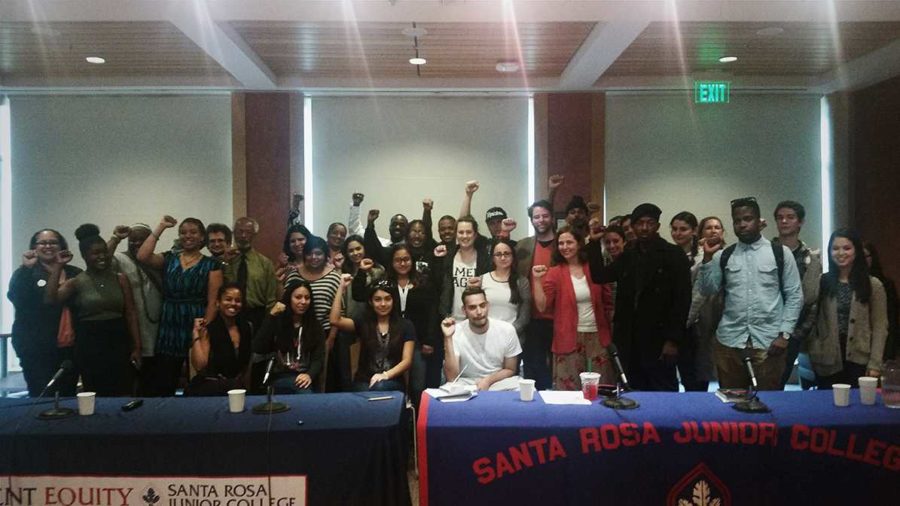In a time when college education has never been more important, half of students attending college won’t graduate with a degree, including students at Santa Rosa Junior College.
This startling trend has an enormous effect on black students, who already have a low attendance rate compared to other ethnicities.
The need for more students of color and lower income to attend college and how they might do so was the topic of the panel “Moving the Needle: From Status Quo to Equity: Strategies to increase Underrepresented Student Enrollment and Retention,” held Feb. 25 in the Girven Student Activities Center in Bertolini.
The panelists consisted of faculty members, the Black Student Union and the Umoja Learning Community. Their names were Damion Square, who co-founded the current BSU three years ago; student representative Dr. Micheal Hale, SRJC English instructor and Umoja academic coordinator; Karlos Kantor, executive director for the Umoja Community Education Foundation and Dr. Karen McCord, Umoja area coordinator and professor of social science, ethnic studies and psychology at Solano Community College.
Panelists recounted their backgrounds, their involvement in the issue and gave opinions on what audience members can do to address the rate of student dropouts. After speaking, the panelists were open to questions.
All speakers name-dropped the Umoja Community, which only recently arrived at SRJC, numerous times. Named after the Kiswahili word for “Unity,” Umoja supports the education and self-actualization of students, primarily black students.
Square encouraged students to be more engaged and active. “Find your purpose and find your niche within this,” he said.
He also warned students, most of whom were black, that there are institutional barriers against minority students. “There are people, there is a system in place that does not want you to succeed,” he said. “They have barriers there to prevent you from succeeding. This is a capitalistic society that we live in, and capitalistic societies can’t afford to educate you.”
Hale talked about what a privilege it was to know students like Square who were so passionate, and urged students to “use your education to serve the public class, to go back to your community and try to resolve some of those oppressive conditions.” He talked about the big changes affecting the U.S. today and what a special time it was for people growing up. He also showed graphs that illustrate the lack of black students who graduate.
Kantor brought up his childhood in Savannah, Georgia and how his family moved to California to start a new life after several prison convictions for both himself and his family. He turned his life around once his professors taught him the importance of education, and raised his family to be “college literate.”
McCord spoke last. She emphasized that she and her fellow panelists were promoting equity and not equality. Equality means everyone receives equal attention, while equity is giving different people the attention they need, especially since some students have bigger disadvantages then others.
Attendees said they liked the message of Umoja. “It recognizes the commonality of the oppression of the working class and the pain we all share,” said SRJC student Stephannie Starr.
Andre LaRue, history instructor at SRJC who helped create the history of American cultures requirement, mediated the panel. Afterword, volunteers took pictures of everyone involved, including the audience.



